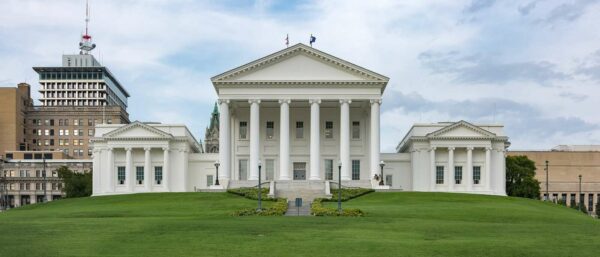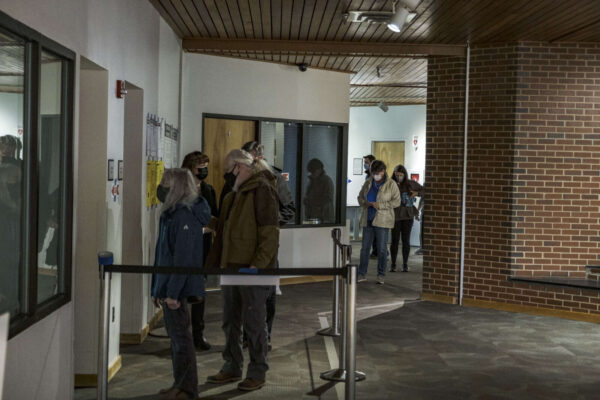This is an opinion column by Del. Ken Plum (D), who represents Reston in Virginia’s House of Delegates. It does not reflect the opinion of Reston Now.
For much of the last two years I have used this column to laud the steps that were being taken in the Virginia General Assembly with the support of then Governor Ralph Northam to bring Virginia into the modern era. Virginia has a rich history, but one that is also shrouded in controversy. There is a tendency on the part of long-time Virginians to want to focus on the earliest history of the Commonwealth in the new nation with an emphasis on the Virginia Statute of Religious Freedom, the Declaration of Independence authored by a Virginian, and the Virginia Declaration of Rights that served as a model for the federal Bill of Rights. Unfortunately, the history that surrounded that era is not so glorious. Forgotten until recent times were the indigenous people who were forced out with the settlement of the colony and new state, the horrors of slavery, a Civil War in which the state was a major battleground, and a white supremacist government until recent years.
The shift in attitudes was not confined to Virginia alone as movements such as Black Lives Matter forced us to examine our history and our actions under the laws as they had been written. The success of Democrats at the polls to control both houses of the General Assembly as well as the governorship and lieutenant governor and attorney general’s offices brought about the amazing changes in the laws of Virginia in 2020 and 2021.
Virginia moved into a leadership role in rewriting its election laws to make them among the most progressive in the nation. Early voting was instituted, absentee voting was permitted without the need for an excuse and voting generally was made more accessible. Laws against all forms of discrimination were passed and hate crime laws were strengthened. Common sense gun control laws were passed including my universal background checks bill. Major steps were taken to end the classroom to prison pipeline, and laws that were unevenly applied to racial minorities were repealed or revised. Symbols that represented the oppressive period of our history were removed. Our educational institutions moved to interpret our history more broadly to be inclusive of all persons who lived in the state.
I was feeling good that democracy was expanded, we were becoming more inclusive, our criminal justice system was being reformed, and our communities were becoming safer. And, then there was the election of 2021. Democrats lost the majority in the House of Delegates, and Republicans swept the statewide elections of governor, lieutenant governor and attorney general.
In the current session of the General Assembly bills have been introduced to turn back all the progress that had been made over the last two years. The clock is being turned back to the more conservative Virginia that many of us have been struggling to get past for many years. All the bills are passing in the Republican controlled House of Delegates. Fortunately Democrats have a majority in the State Senate that will be able to defeat these Republican measures, and our progressive measures will remain in place. We must be eternally vigilant to ensure that while progress might be impeded it is not lost.
This is an opinion column by Del. Ken Plum (D), who represents Reston in Virginia’s House of Delegates. It does not reflect the opinion of Reston Now.
For nearly 250 years of Virginia’s history Black people in the state were enslaved. Following emancipation there was a denial of the rights of Black people in the state, and Jim Crow laws curtailed their freedom. The Lost Cause movement after the Civil War sought to obscure the treatment of Black people as slaves and downplay any contributions they made to society. Only in recent years with the Civil Rights and Black Lives Matter movements have Black people started to receive the recognition they deserve in society and in the state legislature.
Each day in the Virginia General Assembly history is being made as a record number of 18 Black members serve in the 100-member House of Delegates and three Black members are in the 40-member Senate. For most of my career as a delegate the number of Black legislators in the General Assembly could be counted on the fingers on one hand. For the first time ever, Black women are in leadership roles with the Lieutenant Governor of the Commonwealth, the President pro tempore of the Senate, and the House Minority Caucus Chair. A small but significant example of the changes being made are the daily speeches in the General Assembly during February about notable Black Virginians who have not received the attention they deserve
President Gerald Ford officially recognized Black History Month in 1976 to “seize the opportunity to honor the too-often neglected accomplishments of Black Americans in every area of endeavor throughout our history.” Events leading up to the designation of a Black History Month extend back as far as 1926 when the Association for the Study of African American Life and History founded by historian Carter G. Woodson and Minister Jesse E. Moorland started a Negro History Week. The second week of February was chosen as the date to correspond with the birthdays of Abraham Lincoln and Frederick Douglass.
Hopefully the writing and teaching of more complete histories will reduce the need for separate historic celebrations, but there is so much to do in filling in the blanks of histories in the past that left out so much information or distorted it in so many ways. There is a continuing effort on the part of many who see one-sided historical accounts as benefiting the false narrative they continue to present.
There are real concerns that I and others have about what is happening currently in Virginia. As I discussed in a recent column, the Governor’s Executive Order Number One “ending the use of inherently divisive concepts, including critical race theory” has fueled this concern. Adding to the Order, the Governor’s setting up a snitch line for parents and others to report on teachers teaching “divisive concepts” raises further concerns. It’s impossible to teach accurate history without some seeing it as divisive. Hopefully the celebration of Black History Month in the General Assembly will demonstrate that celebrating each other’s successes will not be viewed as divisive but rather as strengthening our common histories and aspirations.
This is an opinion column by Del. Ken Plum (D), who represents Reston in Virginia’s House of Delegates. It does not reflect the opinion of Reston Now.
Many say that I have the best view of the Jefferson-designed State Capitol from the window in my office in the Pocahontas Building where members of the House of Delegates and State Senate have their Richmond offices. It is an awe-inspiring view. This past week workers have been busy dismantling the seating and stand where Governor Youngkin was inaugurated. While the formal structure of the Inaugural has been removed from the outside of the Capitol building, inside the structure of a new government dominated by a new Republican governor and a Republican-majority House of Delegates is quickly taking shape. Campaign rhetoric is being replaced by executive orders and draft legislation. Faces new to Virginia government including the new governor and most of his appointees are moving into their roles in the new administration.
Last week I expressed my concern about Executive Order One and its potential impact on education as it seeks to end “the use of inherently divisive concepts” in schools. My concern has been heightened as the governor has taken a further step in controlling the curriculum of the schools by establishing a “tip line for parents to report to the state any school officials behaving objectionably–including teaching divisive subjects.” On a local radio show the governor said, “We’re asking for folks to send us reports and observations…to help us be aware of their child being denied their rights that parents in Virginia have.” The announcement of the “snitch line” brought a strong reaction from teachers and parents who see this move as adding undue stress to teachers without clear direction.
The Constitution of Virginia puts responsibility for the public school system under the State Board of Education and local school boards. This arrangement has insulated the schools from undue political influence for the most part until the current governor came to realize that running against the schools was attractive to his political base.
Following through on one of his political promises the new governor, acting outside of advice from health experts and demonstrating his willingness to overcome educator objections, lifted the mask mandates that had been put in place as a way to keep the schools open and safe. Most large school divisions ignored his ban on mask mandates, and several districts have asked the courts to decide if the governor has the authority to do what he has done. A decision from the court should be forthcoming in the near future.
In the meantime, on the same radio program the governor justified to the host his ban on local mask mandates by saying that we should “love our neighbor.” I could not agree more with the plea to love our neighbor, but in my mind in a pandemic we should love others as well as ourselves by wearing masks! The governor may have shown his true purpose by expressing to the host that his ban on masks was “moving against the left liberals.” As one who is eternally optimistic, I hope to have a more positive report next week on our getting down to work!
This is an opinion column by Del. Ken Plum (D), who represents Reston in Virginia’s House of Delegates. It does not reflect the opinion of Reston Now.
The General Assembly convenes at noon today, January 12, for its annual legislative session. There has been much speculation since the November election as to the direction the Commonwealth might be heading with the change in partisan control of the three statewide offices and the House of Delegates. The newly-elected lieutenant governor and attorney general were known quantities in state politics having served in the House of Delegates. The newly-elected governor who will take the oath of office at noon on Saturday, January 15, does not have any elective office experience and after having run a campaign of having to thread a needle among the various factions of his party has remained somewhat a mystery as to the direction he might pursue. That was especially true until he had to start taking action to organize his new government.
He set off a firestorm of opposition last week when he announced his pick to be the next Virginia Secretary of Natural Resources. Making up for any lack of experience that he may have in the environmental area, Governor-elect Youngkin announced that he would name former Trump Administration head of the Environmental Protection Agency Andrew Wheeler as Virginia’s chief protector of its rich natural heritage. The reaction from those who have worked in natural resource protection in Virginia was immediate. The Virginia League of Conservation Voters issued a press release stating that Wheeler had “presided over an unprecedented rollback of environmental safeguards intended to protect clean air and water across our country–damage that the agency is still working to repair.” The leader of the organization went further and described the Wheeler nomination as “hands down the most extreme nomination for an environmental post in Virginia’s history and the absolute worst pick the Governor-elect could make.
I share the concerns expressed by the League of Conservation Voters with one exception. I believe the nomination of Becky Norton Dunlop to be the Secretary of Natural Resources in Virginia in 1993 by Governor George Allen to be the worst nomination to ever have been made to a Virginia cabinet post. Dunlop gained her experience in dismantling environmental protection agencies in President Ronald Reagan’s administration, and she wreaked havoc on the environmental protection agencies in the state. It was as many at the time expressed “like having a fox in the chicken coop.”
Emerging evidence indicates that Wheeler will compete with or even exceed the damage done to environmental protection by Dunlop. In July 2019 the Union of Concerned Scientists issued a list in its blog of “10 Ways Andrew Wheeler Has Decimated EPA Protections in Just One Year.” (https://blog.ucsusa.org/elliott-negin/andrew-wheeler-decimated-epa/) Among the concerns was Wheeler’s gutting of the Obama-era coal ash rule after Wheeler had worked as a coal industry lobbyist. He rolled back Clean Water Act protections even as concerns have been raised about the quality of water in this country.
Environmentalists and activists are hard at work bringing the Wheeler record to the attention of the members of the General Assembly who must confirm his nomination. I oppose the nomination, but the history in Virginia is that the governor gets to pick the people in his administration even if it may mean another fox in the chicken coop!
This is an opinion column by Del. Ken Plum (D), who represents Reston in Virginia’s House of Delegates. It does not reflect the opinion of Reston Now.
In the general election in 2021 through a constitutional amendment, Virginia voters decided to transfer the majority party responsibility of turning the census count of persons in the state into as much as practicable 100 House of Delegates districts, 40 Senate districts and 11 congressional districts to a nonpartisan election redistricting process. The outcome of the vote was not even close–2.77 million in favor and 1.45 opposed. The process to keep the outcome as independent as possible was clunky and inefficient but in the end produced a defensible result that will move Virginia into a leadership role of independent redistricting. A reform goal I had worked on for more than 40 years has become a reality.
A scan of the new maps as drawn by the Supreme Court when the commission could not come to a conclusion on a set of maps does not contain any salamander-shaped districts or any grotesque shapes designed to protect the interests of incumbents. The Washington Post described the outcome of the new redistricting procedure as “ending a contentious redistricting process that for the first time gave no say to the state’s elected officials.”
Although there had been much criticism that the Supreme Court could not render an unbiased decision because they are political appointees proved to be misguided. As the Court Order stated, it has” fully complied with federal and state law in the following order of precedence:
- The United States Constitution, particularly Article I, Section 2, and the Equal Protection Clause of the Fourteenth Amendment;
- Applicable federal statutes, particularly the Voting Rights Act of 1965, 52 u.s.c. § 10301;
- The Constitution of Virginia, particularly Article II, Sections 6 to 6-A; and
- Applicable Virginia statutes, particularly Code §§ 30-399(E), 24.2-304.04, and any other relevant provision in Chapter 3 of Title 24.2 of the Code of Virginia.
Although it may have taken you a decade to learn the number of your delegate and senate districts, be aware that all those numbers have changed. My previously numbered 36th district is now the 7th House of Delegates district. Details of the new districts can be found at https://www.vacourts.gov/courts/scv/districting. Discussion of the impact of the new maps is available at www.vpap.org.
Not everyone is happy with the new maps. Having witnessed the redistricting of the Virginia General Assembly over 40 years I can confirm that it is never a smooth and easy process because every incumbent argues for safe districts for themselves and for their party. Every redistricting has been followed by a decade of court suits. That is not likely to occur this year. The legislature can get underway with the important tasks in front of it and spend less time on redistricting as the people indicated in their vote for the constitutional amendment.
 This is an opinion column by Del. Ken Plum (D), who represents Reston in Virginia’s House of Delegates. It does not reflect the opinion of Reston Now.
This is an opinion column by Del. Ken Plum (D), who represents Reston in Virginia’s House of Delegates. It does not reflect the opinion of Reston Now.
With the new year coming up this week and with a new session of the General Assembly about to convene on January 12, I want to wish you and your family the happiest of the new year and to thank all those who have given me the awesome privilege of representing you in the House of Delegates. The pandemic has altered the ways we stay in touch, but I do want to emphasize the importance I feel about hearing from you. Many times we agree on issues, but it is still important to me to hear that you think I am representing your interests and values. Of course, there are times we may disagree, but it can be instructive for both of us to explore our differences to see if there is common ground. And in a democratic society we will sometimes agree to disagree, but I want that to be in a way that is respectful to all.
Communications is so very important in our system of government. While this column is intended to be a renewal of my invitation for you to be in touch with me on issues of concern, I want you to know that I pledge to continue to be in regular contact with you. My weekly commentary on what is happening in state government is available in my electronic newsletter, Virginia E-News, and in the Connection newspaper for this region and Reston Patch.
I encourage everyone to share it with friends and neighbors. If you are not yet a regular subscriber to my electronic newsletter which is free, you can do so on my website, kenplum.com, where you can also review past issues. In addition to my commentary, Virginia E-News contains important information on state government and a calendar of what is happening in our community related to government services.
Many constituents contact me by email at [email protected]. I do review all email even if I am not able to respond to every one personally. Regular mail is also welcomed during the legislative session; send it to me at Virginia House of Delegates, P.O. Box 406, Richmond, VA 23218
While the ongoing pandemic and the surge of the Omicron variant limit the number of in-person events I am attending, I am available for online discussions including the following:
- January 3, 2022, 7:30 to 9:00 p.m., Preview of Virginia 2022 Legislative Session with Delegates Ken Plum and Mark Keam. Learn more and register here.
- January 5, 2022, 10:00 a.m. to 12:00 p.m., Virtual Public Hearing with Appropriations Committee. Express your views on the new state budget. Those persons wishing to speak may register to speak the day before each virtual hearing. View or download an informational flyer with details.
- January 5, 6:00 p.m. I will be joining Senator Jennifer Boysko for a Herndon/Reston Virtual Legislative Town Hall. Register in advance for this meeting.
- January 8, 9:00 a.m. to 1:00 p.m. Fairfax Delegation Public Hearing. Sign up to speak. Additional information is available here.
 This is an opinion column by Del. Ken Plum (D), who represents Reston in Virginia’s House of Delegates. It does not reflect the opinion of Reston Now.
This is an opinion column by Del. Ken Plum (D), who represents Reston in Virginia’s House of Delegates. It does not reflect the opinion of Reston Now.
A combination of an economy producing much more strongly than expected during the pandemic and a frugal state budget in anticipation of a revenue shortfall combined with several federal programs sending enormous amounts of cash to the states has resulted in Virginia having a strong cash position–possibly the greatest ever. Some choose to call the available cash a surplus, but I think a much more accurate term to describe it is an unappropriated balance. The amount involved is more than four billion dollars!
Using the term surplus implies to me that the needs of the state have been met and that there is money left over. As I indicated above, the existing state budget was put together with a very conservative estimate of tax revenue based on a contraction in the economy. Programs were minimally funded or needs were not addressed in order to ensure that the budget would be balanced at the end of the year as constitutionally mandated. Likewise, the availability of cash flowing from the federal government has been much greater than ever before with an expectation that even more dollars will be coming to the states.
With the numerous challenges facing government in general it is reassuring that the availability of funding will not be as great an issue as it has been in recent years. The list of unmet needs for those who view government’s role broadly can be reduced by the available cash. For others, the availability of cash in government coffers raises the prospect of tax cuts. The incoming governor has indicated that he favors tax cuts. Virginia’s tax rates are among the lowest in the country and should a policy of tax reductions be pursued it should be targeted to those with the lowest income.
Certainly tax revenues should never be allowed to exceed the wants and needs of citizens for government services. When there are dollars available the question becomes one of giving monies back to citizens in the form of tax reductions or rebates or using it to provide needed services. Cutting taxes is an approach that is appealing to most politicians and is one that I think should be pursued when it can be done responsibly. In Virginia at this time I believe there are too many unmet needs to be doing anything in the budget other than providing funding for programs and services that have been needed but unfunded for years.
There is a waiting list estimated at over 12,000 individuals who qualify for assistance because of a developmental disability, but that list is reduced by only a few thousand persons per year with the need growing faster than programs or services to meet them. There is a wide disparity of funding across jurisdictional lines for public education even though there is a composite index that is supposed to smooth out the differences. The lack of equity in funding among counties and cities is unjustifiable as are the differences across colleges and universities. In coming columns, I will be discussing other unmet needs. It is not possible to have a budget surplus when there is so much left to be done!
 This is an opinion column by Del. Ken Plum (D), who represents Reston in Virginia’s House of Delegates. It does not reflect the opinion of Reston Now.
This is an opinion column by Del. Ken Plum (D), who represents Reston in Virginia’s House of Delegates. It does not reflect the opinion of Reston Now.
When the final recount of votes in the two districts that were within a percentage point difference between the candidates are finally certified, it appears that in the House of Delegates the Republicans will have a 53 to 47 majority. Such a shift in partisan control is often referred to as “flipping the House” or “turning the House from blue to red.” Democrats who took control of the House in 2019 were not able to withstand the shifting winds as the string of Democratic governors was broken when former Governor Terry McAuliffe who had been out of office for a term as required by the State Constitution was not able to win a second term. Some have observed that the Virginia governorship election that is held the year after the presidential election is most often won by the candidate of the party opposite that of the president. The Youngkin win to be governor after the Biden win followed that pattern.
With the change in partisan control of the House of Delegates, members will find themselves having different roles. The Democratic Speaker of the House and the first woman and first Jewish person to be speaker will lose her position to a new speaker elected by the majority Republican caucus. At the time of writing this column the rumor is that Delegate Todd Gilbert who represents a part of the Shenandoah Valley will be the new speaker. The Speaker of the House has total control over appointing members to committees. Too often including in the recent past the practice has been to take members of the minority party off the key committees on which they may have had the most influence. The shuffling of members on committees has been a way for the majority to solidify its power.
The way in which the transition of power has been handled in the past by both parties has led to many inefficiencies in the legislative process. Rather than a continuous process responding to the needs of the Commonwealth there have been many fits and starts that delay needed legislative action.
Of course, the winning party always wants to assert its power. I understand that to the victors go the spoils. But much of what the legislature does should not be partisan. Virginians showed again in this election cycle that they are not clearly blue or red. No Democrat celebrated more than I did the transformative actions taken by the legislature over the past two years. Hopefully the new governor and the new House leadership will not throw out all that work and start over. We can build on those things for which there are areas of agreement.
I will be pleading with the new administration that we view the next several months as time to look at reforms in the process on which we can agree. We need not spend time on seeking revenge on those who have been in office in the past. The winners in such an approach will be the people of Virginia and not a single political party.
Democrats continued to hold onto their trifecta of power in local races for the Virginia House of Delegates.
With 12 of 17 reporting, Democrat Ken Plum retained a stronghold over challenger Matt Lang, a Republican veteran, retaining nearly 72 percent of the vote for the 36th District. Lang secured a little over a quarter of the total vote.
Plum has served as House Delegate for the 36th District since 1982. He turns 80 the day after the election.
Democratic candidate Irene Shin — who knocked off incumbent Ibraheem Samirah in the June Democratic primary — also had a dominant lead over her Republican opponent, Julie Perry for the 86th district seat.
Shin clenched 66 percent of the vote while Perry had just 33 percent of the vote as of around 9 p.m. today. Just two of the county’s 13 precincts remain open.
Perry is a public school history teacher while Shin is the executive director of a nonprofit organization on civic engagement. The seat covers Herndon, Oak Hill, and Chantilly and some parts of Loudoun County.
Plum handily defeated a primary challenge with more than 77 percent of the vote in June.
After an otherwise uneventful day, the county’s Office of Elections had to rescan 20,000 in-person early voting ballots. Spokesperson Brian Worthy said there was “corrupted electric media” where votes were recorded in the machine used at early voting sites. The issue affected four of 38 machines.
Roughly 66 percent of Fairfax County voters voted for Democrat Terry McAuliffe — cementing its historically blue history. But Republican Glenn Youngkin appears to be inching ahead, with around 55 percent of the vote across the state.
The county’s elections office reported a turnout of 49 percent overall. But that number is expected to rise, as it did not account for three hours of voting.
All 100 House of Delegates seats were on today’s ballots. Currently, Democrats have a majority with 55 members to 45 Republicans.
This story was updated at 10 p.m. Angela Woolsey contributed to this report.
Herndon Police Chief Maggie DeBoard says that the lack of beds in mental health facilities is compounding a mental health crisis and taking much-needed local officers off the streets for extended periods of time.
Currently, law enforcement officers must transport mentally ill individuals who are a danger to themselves and others to a state facility for treatment if a temporary detention order is issued. Those orders, which are issued by a magistrate, can last for up to 72 hours, tying up police officers who often have to sit with the individual until a bed is found.
“It is a significant drain on staff,” said town attorney Lisa Yeatts.
At a meeting before the Herndon Town Council earlier this month, DeBoard encouraged the town council to support state legislation that would prohibit the issuance of temporary detention orders when space is not available at a state health facility.
Often, state facilities do not have beds. And when they don’t, police officers must stay alongside the individual until a bed is available or the temporary detention order is lifted.
In one instance last month, two Herndon police officers — one of whom was certified but in training — had to transport a man who voluntarily agreed to come with police for mental health evaluation from his home. While on the interstate, the man began strangling himself in the backseat of the police car with the seatbelt.
Police pulled over, de-escalated the situation by force, and tried to find a bed for the man for 23 hours.
Eventually, they found a bed in Petersburg — nearly 141 miles from the Herndon Police Department. In another case, police officers had to travel to Roanoke with a person in a mental health crisis.
DeBoard noted that the crisis is complex and cannot be explained by a shortage of beds alone. State funding for private transportation, limited local resources, lack of coordination between mental health facilities and law enforcement were identified as other factors.
In July, five of the state’s eight mental health hospitals were closed to new admissions. The facilities were ordered to reduce their bed capacity and consolidate staff because of a workforce crisis that caused a “dangerous environment where staff and patients are at increased risk for physical harm,” according to Alisan Land, commissioner of the state’s Department of Behavioral Health and Departmental Services.
The Virginia Association of Chiefs of Police and Foundation stated that law enforcement did not create this problem and cannot solve it alone. In a statement earlier this year, the organization wrote the following:
Mental health professionals have shared that it isn’t whether the person has insurance that determines whether a bed is found. The critical problem hospitals are facing is the growing number of violent persons in mental health crisis that the hospitals and mental health facilities can’t accommodate and that present a great risk for staff. We can empathize but law enforcement can’t solve this problem.
The state’s mental hospitals have been struggling for years to handle a spike in admissions. State law requires them to admit patients after eight hours if a bed can’t be found at another facility, including private ones.
Councilmember Signe Friedrichs said that she has seen the local health impact of this crisis. She got involved in a situation when an individual was screaming on the streets of the town, creating a stressful situation for the individual, the business owner involved, police officers called, and a taxi driver asked to come to the scene.
“All of these things are cascading and causing more difficulty for the police,” Friedrichs said.
The problem will require a solution with a coordinated effort from the state as it is a statewide challenge, DeBoard said.

(Updated, 4:30 p.m.) In the race for 36th District, incumbent Ken Plum was outraised by Republican challenger Matt Lang during July and August according to the latest campaign finance reports.
Lang raised just over $12,500 dollars during the summer months while Plum raised about $7,400.
“I’ve already raised more than that in September alone,” Lang tells Reston Now. “Voters are paying attention and like what they see.”
However, due to Plum’s fundraising efforts earlier in the year, the incumbent far exceeds the challenger in regards to both overall cash raised and ending balances.
Plum has raised about $140,500 during this election cycle, while Lang is about a quarter of that at about $33,400. In terms of ending balances, Plum currently has about $73,000 in his coffers while Lang has about $13,600.
Plum’s highest fundraising months were in April and May while he was in a midst of primary challenge against Mary Barthelson, raising more than $50,000 in those two months alone. He won that race easily with about 77% of the vote.
Digging a bit deeper reveals that Lang’s funds since the beginning of the year have come from a mix of individual contributors and Republican-backed political action committees.
The PACs that have given money to Lang include the 11th Congressional District of VA Republican Committee, Virginia Wins (buoyed by a million dollar donation from Virginia gubernatorial candidate Glenn Youngkin), and New Mission Commonwealth, which donates to Republican candidates who are veterans.
This a bit of a contrast to Plum, who mainly has gotten money from assorted companies, corporations, and labor unions as well as individual contributors and political actions committees.
The companies and corporations that have donated to Plum include several that are higher profile. This includes Westrock, America’s second-largest packaging company, waste management company Covanta Energy, Anthem Blue Cross And Blue Shield, and Total Wine & More (owned by Maryland Congressman and Democrat David Trone).
All of these companies have a presence in Virginia.
Additionally, Plum also received money this election cycle from Amazon, which is building a headquarters in nearby Arlington, and a cannabis company called Golden Piedmont Labs from South Boston, Virginia. In April, the General Assembly voted to legalize marijuana possession in Virginia and now are looking to speed up the ability to sell it for recreational purposes.
When asked about these contributions, Plum tells Reston Now that sometimes companies and corporations give without him knowing. But he would never let it factor into his decision-making process.
Additionally in July and August, Plum used a chunk of his considerable campaign chest to donate to other Democrats running in Virginia, including Irene Shin, who is running for the delegate seat in the nearby 86th District, and Wendy Gooditis vying for re-election in the 10th District. He also contributed money to Schuyler VanValkenburg’s campaign in the 72nd District and Chris Hurst’s in the 12th District.
“I can’t signalulary get the job done in Richmond,” he says about why he uses his campaign funds to help other candidates. “We need others who are progressive Democrats and share my values to get things done… it’s certainly worked recently.”
Plum says he plans on sending out more checks in the coming weeks to help other candidates.
Lang’s expenses in July and August were majority for consulting services, advertising, and fundraising event-related items.
The reports that were just filed this past week covered campaign financial information from July and August. The last report for this cycle will cover September and October items and will likely be released after the November election.
Early voting started this past Friday (September 17) and will continue to election day, November 2.

COVID-19 Vaccine Recommended for Pregnant People — “COVID-19 vaccination is recommended for everyone 12 years and older, including those who are pregnant, breastfeeding or would like to get pregnant. The rise in COVID-19 cases, low vaccine uptake among pregnant people, and the increased risk of severe illness during pregnancy make vaccination more urgent than ever.” [Fairfax County Health Department]
Local Cycling Studio Announces Vaccine Requirement — Starting Sept. 1, New Trail Cycling in Lake Anne Plaza will require patrons to provide proof that they’ve been fully vaccinated against COVID-19 to take an indoor class. Owner Liz Camp says she’s not aware of any other businesses in the Reston and Herndon area with a similar policy but felt it’s a necessary extra step to keep people safe and healthy as cases rise. [New Trail Cycling]
Police Union Supports Eliminating Ticket-Writing Quotas — The Virginia Police Benevolent Association, which represents 750 state troopers, says it’s working with the General Assembly on a law that would prohibit law enforcement agencies from imposing quotas on officers, saying that approach is outdated and leads to more negative interactions with the public. Virginia State Police officials deny using quotas, but emails suggest troopers are evaluated in part by how many tickets they write. [WTOP]
Photo via vantagehill/Flickr

After nearly a year and a half spent working with colleagues over video, Del. Ken Plum was happy to be able to see all of his fellow Virginia General Assembly members in-person again.
“It’s good to see and work with people after such a profoundly long time,” said Plum, who represents Virginia’s 36th House District, including Reston.
When the Virginia General Assembly met for a special session on Aug. 2, it had been about 17 months since the entire legislature last convened in person at the State Capitol in Richmond. With COVID-19 cases again on the rise, lawmakers still saw some notable deviations from their usual procedures.
Plexiglass walls surrounded a number of legislators’ desks with many wearing masks, though not everyone did, despite Gov. Ralph Northam’s recommendation late last month.
“All the Democrats seem to be wearing masks,” Plum told Reston Now by phone as he sat in the back of the chamber waiting for it to reconvene after a recess. “Many Republicans have chosen not to [wear masks].”
The General Assembly concluded the special session yesterday (Tuesday) after approving a host of new appeals court judges and a plan for spending $4.3 billion in federal aid.
The American Rescue Plan Act package included:
- $800 million for unemployment
- $120 million for utility bills assistance
- $700 million to expand rural broadband access
- $411 million to improve aging sewer infrastructure and provide better access to clean water
- $353 million for small-business recovery
- $250 million to fix school HVAC systems
Additionally, $1.1 billion — about a quarter of the aid — is being left unappropriated in case those funds are needed later this fiscal year.
“We are getting monies out to communities and residents that need it,” Plum said.
In addition to allocating coronavirus relief funds, the General Assembly voted yesterday to confirm eight new judges to the Virginia Court of Appeals. That expands the number of seats on the court from 11 to 17, as the Commonwealth will allow appeals for all civil and criminal cases to the court for the first time.
The confirmations also make the Court of Appeals significantly more diverse by adding four Black judges and four female judges.
Several locals are now on the court, including Fairfax County Circuit Court Judge Daniel Ortiz and Vernida Chaney, a former Fairfax County public defender.
“For the first time, this is no longer a white boys and girls’ club,” Plum said. “The appelate will look and feel like a justice system representing the full community.”
He noted that it was an “incredibly exhaustive effort” to vet and choose the right people after more than 80 candidates applied.
“That’s a lot, which is wonderful and means people are interested,” Plum said.
While Plum is comforted by being able to work again in person, he believes a hybrid approach would be ideal, allowing votes to be cast in person, for example, while public meetings and other activities that might draw people from far away can be conducted virtually.
“[Zoom] actually didn’t limit participation, but expanded it,” Plum said. “It wasn’t all bad and we shouldn’t give up on it entirely.”

Reston Woman Dies After Car Crash — Stephanie D. Garcia, 29, of Reston died at Fairfax Inova Hospital on Aug. 8 from injuries she sustained the previous day in a two-car crash on I-95 at the 169-mile marker in Springfield. Reportedly not wearing a seatbelt, Garcia was thrown from her car when another vehicle struck it head on while she was making a U-turn. The other driver was transported to a hospital for treatment of serious injuries. [Virginia State Police]
D.C. Restaurant Week Returns — The Restaurant Association Metropolitan Washington’s summer D.C. Restaurant Week kicked off yesterday (Monday) and will last through Sunday (Aug. 15), with many participants again offering to-go options. Reston-area venues include Founding Farmers, Makers Union, The Melting Pot, and more. [Viva Tysons]
Construction on Autumnwood Pickleball Courts Begins — “Construction has begun on the permanent pickleball courts at the Autumnwood Recreation facility. Pickleball players have been temporarily moved to courts 3 and 4. Tennis will no longer be played at Autumnwood until the new pickleball courts are finished in September. When construction has been completed, tennis will resume at Autumnwood.” [RA News]
General Assembly Approves COVID Relief Plan — “The General Assembly on Monday approved a spending plan for $4.3 billion in federal coronavirus relief money, with lawmakers leaving about $1.1 billion unappropriated so it is available for future needs if the pandemic worsens…The plan calls for using $800 million of the American Rescue Plan money to replenish the state’s unemployment trust fund, $700 million for rural broadband, $411 million on clean-water projects, $353 million for small-business relief and $250 million for school ventilation systems.” [The Washington Post]
Photo via vantagehill/Flickr

Masks Now Required in County Facilities — “Beginning Monday, Aug. 9, all employees and visitors — regardless of vaccination status — will be required to wear a mask while inside all Fairfax County facilities to help stop the spread of COVID-19…The rise in COVID-19 cases has resulted in the Fairfax Health District moving from moderate to substantial community transmission. This is due to the on-going spread of the highly contagious Delta variant of the COVID-19 virus.” [Fairfax County Health Department]
Former FCPS Student Gets Olympic Gold — The U.S. finished first in the men’s 4×400 meter relay at the 2020 Tokyo Olympics on Saturday (Aug. 7), besting the Netherlands and Botswana. Former South County High School student Trevor Stewart helped Team USA reach the finals by leading the qualifying round on Friday (Aug. 6). He was not in the final heat but will still bring home a gold medal. [Olympics]
General Assembly Reaches Deal on COVID-19 Relief Spending — Virginia’s Senate and House will vote today (Monday) on a deal that negotiators reached late Friday for how to spend $4.3 billion in American Rescue Plan funds. Changes from Gov. Ralph Northam’s original plan include the addition of one-time bonuses to sheriff’s deputies, a boost to Medicaid rates for workers who serve individuals with disabilities, and a requirement that the Department of Motor Vehicles reopen for walk-in services that had been halted during the pandemic. [The Washington Post]
NoVA Science Center Eyes 2022 Groundbreaking — The Fairfax-based Children’s Science Center hopes to break ground next year on its long-planned Northern Virginia Science Center in Loudoun County. The project has expanded from its original design, necessitating a relocation to a site that will accommodate an “expansion wing with a dome theater for large-format films and potentially even a planetarium contemplated for a future phase.” [Washington Business Journal]
Photo via vantagehill/Flickr



